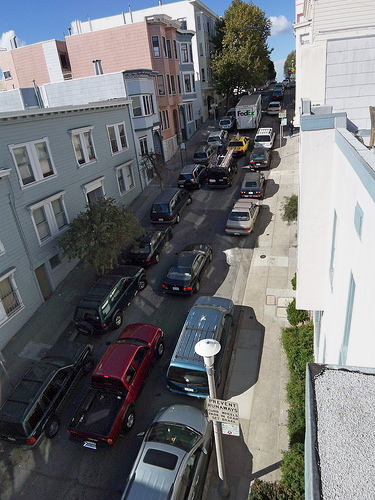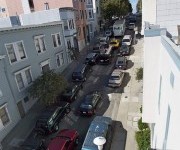 The streets of San Francisco will have fewer cars if the city’s transportation agency has its way.Photo: Victoria AmatoThe City of San Francisco is steering toward a future with fewer cars.
The streets of San Francisco will have fewer cars if the city’s transportation agency has its way.Photo: Victoria AmatoThe City of San Francisco is steering toward a future with fewer cars.
In a meeting earlier this week, the board of city’s Municipal Transportation Agency supported a plan in which the role of the personal motor vehicle would be radically reduced. From the San Francisco Chronicle:
At a 3 1/2 hour workshop to informally discuss priorities and the revision of the agency’s strategic plan, the agency’s Board of Directors supported the vision suggested by Executive Director Nathaniel Ford of transforming the city into a place where driving would be the last choice for people seeking to get around.
“Like in the FDA’s food pyramid, too many cars are not good for you,” Ford said.
Private automobiles, especially those containing only a driver, should remain part of the city’s transportation future, directors said. But they should not dominate use of the city’s scarce transportation resources nor the bulk of its roads and rights of way.
“Private autos do deserve a place,” said Cheryl Brinkman, a newcomer to the board, “but the goal is not to make them the most convenient choice.”
One way of doing that, of course is to make transit more convenient. A recent survey, however, showed that could be a challenge as steep as any hill in San Francisco.
Only 52 percent of MUNI riders say they are satisfied with the city’s transit service, the lowest number since 2001. Service cuts and fare hikes have likely contributed to disgruntlement among those who use the system.
Given California’s fiscal disaster, turning that trend around will require creative solutions. San Francisco has already shown that it’s willing to try controversial experiments in automobile traffic management. A pilot program to divert cars off Market Street has meant better conditions for people biking and walking on one of the city’s main thoroughfares. The program has also reduced bus travel times.
MTA board members cited the Market Street project as the type of initiative that could entice the city’s residents out of their vehicles.



